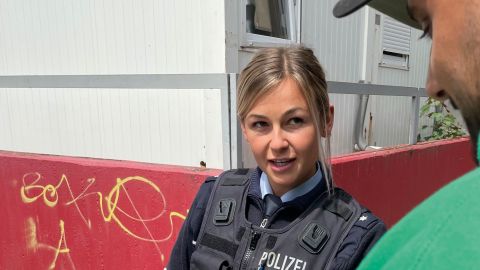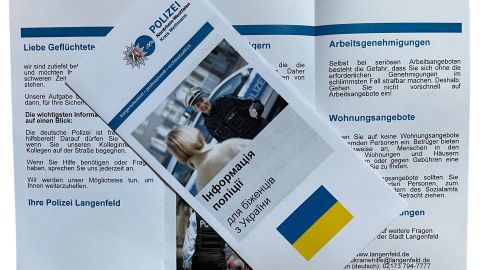The woman in the yellow hoodie smiles as she steps outside the door of the Wilhelm Würz sports hall in Langenfeld-Richrath to smoke a cigarette. Because Julia Cherkas is smiling back at her. The police superintendent has already been to the temporary accommodation for refugees from Ukraine several times. The flyers she hands out say in German and Ukrainian: "The German police are friendly and helpful! You can trust that when you meet our colleagues on the street." Cherkas (25) embodies friendliness and helpfulness. People trust her. Also and especially because she speaks Ukrainian.
In April, she spent three weeks supporting the crime prevention/victim protection department of the Mettmann district police authority. She had been loaned there by the guard and change service in Langenfeld. Together with Detective Chief Inspector Christoph Voßwinkel, she visited around 40 facilities for refugees from Ukraine in the Mettmann district and made the residents aware of the potential dangers posed by fraudsters in their new environment.
Julia Cherkas offered her services as a contact officer when she realized that there was a need. "That was great for us," says Voßwinkel, "we were in the process of designing flyers and posters."
The flyers originally designed by Münster police headquarters (see Streife 02/2022), which have been adapted with regional contact details, warn against dubious housing and work offers and point out the challenges involved in obtaining a work permit, among other things.
"I also spoke to the refugees about human trafficking and prostitution - a great danger, especially for women and girls," reports Cherkas. "It was striking that the Ukrainian women had not reckoned with these dangers in Germany."
However, the Ukrainian women also approached the German police officer, who was born in their home country, with confidence when it came to everyday problems. Otherwise, there was a lack of contact persons and translators for issues such as finding a job or a place to live. Grief, helplessness, resentment - she was confronted with all of these emotions. "I met a lot of traumatized people," she says, "One mother only communicates with her sons via cell phone with emojis because she's worried she might be bugged."
However, the work fulfilled her. When she is on guard duty, she sometimes feels the anger of citizens about police measures. Here, however, she is always welcomed with open arms. "I have been able to accompany many fates and have learned a lot."
At the age of five, her mother, who had previously gone to Germany as an au pair, brought her to the Rhineland from a rural region near Lviv. Every summer, Julia traveled to grandma and grandpa in Ukraine. "The people there in the countryside hardly know the police," she says. The nearest police station is three quarters of an hour's drive away. She can't remember ever hearing a siren or seeing blue lights there. "That's why it's difficult for some refugees to make contact with a policewoman." Even though she has had to use her Ukrainian from time to time in recent years, her language skills have never been as important as they are today. Incidentally, she does not speak Russian, the language of many city dwellers in Ukraine. The difference between the two languages is too great,
The last time Julia Cherkas was in her home country was a year and a half ago. A trip to Kiev was planned for this year. She wanted to introduce her boyfriend to her relatives there. But they have now had to leave the capital and flee to the west of the country. Cherkas' aunt, uncle, cousin and cousin still live in Ukraine - as does her father. "We are in contact every day," she says.
In February and March, at the beginning of the war of aggression, the situation was very stressful for her. Voßwinkel was also worried about whether he was asking too much of his young colleague with this special assignment. "Now I've got used to it - unfortunately. The situation doesn't affect my life," she says, "I have hope that everything will be okay again." Her mother is active every day in Odenthal helping refugees. "Mom always says: If I can't help in Ukraine, at least I can help here." Just like Julia Cherkas.

